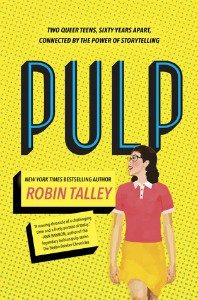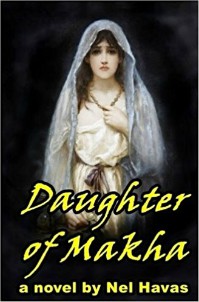This is not a pulp fiction book. This is a book which understands how to take a genre and perfectly shine a mirror upon it. I’m genuinely surprised by how much I enjoyed it, as sometimes historical fiction (particularly American historical) can be far more concerned with the context of the time than how any of the characters are feeling or growing. Robin Talley seems to know this, and she writes characters who are flawed and conflicted, knowing when they need to grow and when they need to hold true to themselves.
Pulp has a two protagonist structure, alternating between the points of view of two lesbian high school seniors: Abby’s in 2017 and Janet’s in 1955. Where a lot of books try to obscure their contemporary protagonist into the vague “now” timeframe, Talley leans heavily into the political and social landscape of 2017, making even the contemporary chapters into a period piece themselves, which I think will age well. The comparison between the two eras is compelling and complex, and a large part of what kept me reading. 1955 is painted as a cold and harsh environment for queer people and people of colour alike, whereas the 2017 chapters serve to remind us how far we have come but how much we also still must do.
The pacing of the book was awkward to begin with. As a reader with ADHD, I struggled with Abby’s inner monologue jumping around over the top of dialogue, and found myself going back half a page at a time to catch the flow of conversation. However, this seemed to improve when I was only a few chapters in, and the quality of the Janet scenes made up for it until then. Throughout the plot, the two character’s are slowly woven together by their self discoveries, love of writing, reading, and most of all, pulp fiction.
Talley obviously wrote this book with a keen awareness of the need to be intersectional with her politics and diverse with her cast. The protagonists are White Catholic and Jewish, and the supporting characters span a range of racial backgrounds, sexual orientations and genders. I was pleasantly surprised to find a character using they/them pronouns! It’s seems to be written from a solid grounding in internet culture and fan fiction, so at times Abby’s point of view can come across as a little contrived, but in a way that I don’t think audiences who read a lot of YA fiction will mind much. If you are into fan fiction theory, transformative works, or metafiction, then this is certainly a good read for you.
I would recommend this book to anyone who wants to know more about the roots of queer culture but I would exercise caution for those who are emotionally affected by the current political climate in the USA The book is very educational, even including things I didn’t know as an activist, but also leans heavily on protest culture in 2017 and can hit a bit close to home sometimes. I will say that if you should be looking for a satisfyingly hopeful book, I think you have found it. Robin Talley, to my mind, has very shrewdly shown us that however awful things may seem right now, they will get better because we will make them so.
Casey is a non-binary bookseller and writer, a sometime poet and an all-the-time queer. Their favourite genre is usually sci-fi / fantasy, but they can be found reading kids books and angsty YA whenever the mood strikes. Most of their reads are for audiobooks because they have ADHD and printed text is not their friend. They recently attempted to start a bookstagram which you can find here @know.thy.shelf

